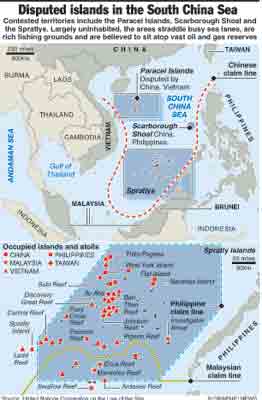NEW DELHI - Even in an age of 24-hour globalized news, some important events only come to light well after the fact. Something of this sort happened several months ago in the South China Sea - and may shape how relations between the world's two most populous countries, China and India, develop in the years ahead.
While returning in late July from a goodwill visit to Vietnam in waters recognized as international, an Indian naval ship was "hailed" on open radio and advised to "lay off" the South China Sea. Although naval incidents between China and its near neighbours — particularly Vietnam, Japan, and the Philippines — are not unusual, this is the first one to involve India.
Why did China attempt to interfere with a ship sailing in open seas? Was this "merely" another of China's unwarranted assertions of sovereignty over the whole South China Sea, or was something more malevolent afoot?
At China's Foreign Ministry, a spokesperson explained: "[W]e are opposed to any country engaging in oil and gas exploration and development activities in waters under China's jurisdiction." Then, in passing, he added that "countries outside the region, we hope…will respect and support countries in the region" in their efforts "to solve…dispute[s] through bilateral channels."
India's government responded promptly: "Our cooperation with Vietnam or any other country is always as per international laws, norms, and conventions," it declared, stating that "cooperation with Vietnam in the area of energy is very important." Indeed, Indian companies already have invested heavily there, and are seeking to expand their operations.
Although India's statement is explicit enough, doubts persist. Is the two countries' argument merely about who will develop the South China Sea's untapped energy resources, or are we dealing with the beginning of a struggle for spheres of influence?
To find an answer requires confronting civilisational norms, which are reflected in the intellectual games that the countries favour. India has traditionally favoured the game of chaupad (four sides), or shatranj (chess), concentrating on contest, conquest, and subjugation. China, on the other hand, has wei qui (known in Japan as go), which focuses on strategic encirclement. As Sun Tzu advised many centuries ago, "Ultimate excellence lies…not in winning every battle, but in defeating the enemy, without ever fighting."
A recent US Defence Department paper, "China's Military and Security Developments - 2011," argued that "China's 'near sea' politics has seriously disturbed not only India, but Japan, Australia, the US, and the ASEAN countries." In response, China's Defence Ministry proclaimed that "China and India are not enemies, not opponents, but neighbours and partners."
So where do things stand? It is clear that India, given its years of cooperation with Vietnam on oil and gas development, is not about to acquiesce in China's claim to the South China Sea. Moreover, as energy extraction begins, a new memorandum of understanding between India and Vietnam is scheduled to be signed later this year. China was most likely reacting to these developments by accusing India of violating its territorial waters.
For India, the sense that a struggle for regional mastery is occurring has become increasingly keen. Chinese activity in Pakistan and Myanmar, the expansion of China's port agreements in the Indian Ocean (the so-called "string of pearls"), and heightened Chinese naval activity in the Indian Ocean have jangled India's security antennas. Indeed, the official Chinese publication Global Times, altering its previous stance, recently called for putting a stop to India's energy plans in the region. "Reasoning may be used first, but if India is persistent in this, China should try every means possible to stop this…from happening."
The same article then threw Tibet into the stew of accusations. "Chinese society," it continued, "has…been indignant about India's intervention in the Dalai [Lama] problem," cautioning India to "bear in mind" that "its actions in the South China Sea will push China to the limit." According to Global Times, "China cherishes the Sino-Indian friendship, but this does not mean China values it above all else."
There was a more broader, more ominous message as well, one that belies China's official rhetoric of harmony: "We should not leave the world with the impression that China is only focused on economic development, nor should we pursue the reputation" of being a "peaceful power, which would cost us dearly."
It is this "triumphalist" foreign policy, as Henry Kissinger calls it, with which India has to contend. The "Chinese approach to world order," writes Kissinger in his new book On China, is dissimilar to the Western system of "balance of power diplomacy," primarily because China has "never engaged in sustained contact with another…." on the basis of the concept of the "sovereign equality of nations." As Kissinger, a committed Sinophile, points out: "That the Chinese Empire should tower over its geographical sphere was taken virtually as a law of nature, an expression of the Mandate of Heaven."
Perhaps India and others should contend with China's assertiveness by heeding Sun Tzu's counsel: "Contain an adversary through the leverage of converting the neighbourhood of that adversary into hostiles." Just as China has cultivated Pakistan, is India's growing embrace of Vietnam a counter-move on Asia's strategic chessboard?
Perhaps. After all, just as India recognises China's vital interests in Tibet and Taiwan, there must be reciprocal recognition of India's national interests. China must fully accept that any effort at strategic encirclement of India will be countered. That is an Indian national-security imperative. So is restraint and mutual cooperation - as is true for China as well.
Jaswant Singh, a former Indian finance minister, foreign minister, and defence minister, is the author of Jinnah: India - Partition - Independence.
Copyright: Project Syndicate, 2011. Exclusive to the Sunday Times |


